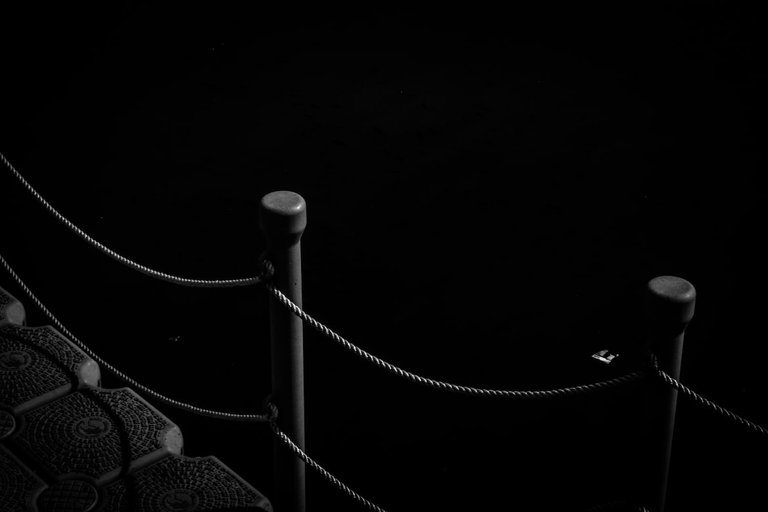


Durante la hora de descanso, Víctor durmió profundamente. Al despertar, sintió que había olvidado algo importante. Abandonó la habitación y caminó por los pasillos del edificio en construcción. Todo estaba en penumbras, como si hubiera anochecido. No había nadie en los alrededores. Los carpinteros, herreros, plomeros, arquitectos, ingenieros, albañiles, ayudantes. Todos habían desaparecido.
Pensó que a lo mejor seguía dormido. Salió de la zona en construcción al corazón de la metrópolis y se asombró al ver que las calles también estaban vacías. Los carros sin conductores, en medio de la carretera, frente a semáforos en rojo. Las tiendas abiertas sin nadie que las atendiera o consumiera sus productos. Un puesto de perros calientes abandonado, como si el vendedor y su clientela hubieran salido corriendo al enterarse que venía una catástrofe.
Se dirigió al complejo de apartamentos donde vivía, con la certeza de que algo grave había ocurrido y suspiró aliviado al ver que dentro de la caseta del edificio estaba el vigilante. No podía ver el rostro de este hombre porque la mampara se lo impedía; pero no le importó, solo quería hablar con alguien.
—Disculpe, ¿a dónde fueron todos? —preguntó.
El vigilante no respondió.
Víctor comenzó a sentirse nervioso.
—Disculpe, amigo… Este… —Dudó. Luego recordó el nombre—: Tomás, ¿qué está pasando aquí?
El vigilante tembló como una sombra en la pared antes de pronunciar las siguientes palabras:
—¿Qué hora es? —Su voz era gruesa, oscura, como si proviniera de las profundidades de la tierra.
Víctor lo miró atónito, pensando en lo absurda que era la pregunta; en la entrada del edificio había un reloj digital muy grande en el que se leía claramente… ¿qué número era aquel? ¿Un doce? ¿Un tres? ¿Eran las seis o las nueve? Víctor sintió que los números en el reloj cambiaban cada vez que él parpadeaba y se restregó los ojos con la yema de los dedos, como si quisiera aclararse la vista, pero los números seguían saltando de uno a otro. Miró otra vez hacia la caseta y encontró el reflejo de su sombra en el cristal. El interior estaba vacío, como las calles a su alrededor.
—Debo estar volviéndome loco —dijo—. Tal vez eso pasó en la ciudad: todos se volvieron locos y desaparecieron. Pero ¿a dónde fueron?
Asustado por la soledad que lo rodeaba, corrió por las calles, como si escapara de una fuerza superior. Pasó frente a un callejón y un indigente lo llamó por su nombre.
—¡Víctor! —gritó aquel hombre desde el suelo del callejón, rodeado de un montón de basura—. Hoy se cumplen cien años. ¿Sabes qué hora es?
Víctor frenó sus pasos y miró al hombre oculto entre las sombras. No podía ver su rostro, pero la voz era tan familiar que sintió que estaba reencontrándose con un viejo amigo.
—Lo siento —dijo—. No tengo reloj, pero deben ser las… mmm… —Miró hacia el cielo para saber la posición del sol y se frustró al notar que las nubes negras cubrían el firmamento. Volvió su mirada hacia el indigente y dijo—: Deben ser las seis.
—Las seis —repitió el indigente con aquella voz familiar. Luego comenzó a reírse.
—¿Qué le parece tan gracioso? —inquirió Víctor. Pero el indigente no respondió. Su risa se volvió cada vez más grotesca y aterradora. Era tan fuerte que resonaba por toda la calle—. ¡Locos! ¡Todos se han vuelto locos! —exclamó Víctor antes de seguir corriendo desesperadamente.
Poco después, llegó hasta los muelles de la ciudad. Incluso la gran feria que había en aquella zona estaba desolada, como si el viento hubiera barrido a los habitantes de un soplido. La rueda de la fortuna chirriaba al girar lentamente, sin nadie que la ocupara. Las risas de los niños, la vieja música de feria, los estruendos de los globos cuando explotan, el sonido de las máquinas de juegos, eran solo un recuerdo lejano. Las luces a lo largo del muelle se apagaban y encendían sin ton ni son.
Víctor tomó asiento en uno de los bancos. Había corrido varios kilómetros, sin embargo, no sentía cansancio, ni sed o hambre. Una situación anormal para un fumador empedernido que amaba la comida chatarra, cuyo único trabajo consistía en escuchar las quejas de los obreros para hacer un informe y entregarlo al jefe de los sindicalistas. «¿Qué hora es?», pensó. «¿Será de día o de noche? ¿Por qué las nubes son tan oscuras? ¿Cien años? ¿He estado aquí tanto tiempo? ¿Qué es este lugar? ¿A dónde fueron todos? Y yo… ¿a dónde voy? ¿Víctor? ¿Quién es Víctor?»
Sentado sobre aquel banco, divisó un bote en el horizonte. Al principio, era una sombra más entre las sombras. A medida que acortaba distancia, su forma se hizo clara y consistente. Al final, pudo observar que un anciano flaco, mugriento y de barba larga, remaba con parsimonia mientras dirigía el bote hacia el muelle.
Las aguas del río que unían ambos mundos eran negras y apacibles, como la noche más oscura. Cuando el barquero llegó a la orilla, brotaron llamas de sus ojos y dijo:
—Ya es hora.
Y el alma pérdida, todavía sobre el banco, asintió brevemente, recordando por un instante la muerte, antes de subir al bote.





During the hour of rest, Victor slept soundly. When he woke up, he felt he had forgotten something important. He left the room and walked through the corridors of the building under construction. Everything was in darkness, as if it had gotten dark. There was no one around. The carpenters, blacksmiths, plumbers, architects, engineers, bricklayers, helpers. They had all disappeared.
He thought maybe he was still asleep. He walked out of the construction zone into the heart of the metropolis and was amazed to see that the streets were also empty. Cars without drivers, in the middle of the road, in front of red lights. Stores open with no one to serve them or consume their products. A hot dog stand abandoned, as if the vendor and his clientele had run away when they heard that a catastrophe was coming.
He went to the apartment complex where he lived, certain that something serious had happened, and sighed with relief when he saw that inside the building's guardhouse was the watchman. He could not see the man's face because the screen prevented him from doing so; but he did not care, he just wanted to talk to someone.
"Excuse me, where did everyone go? "he asked.
The watchman did not respond.
Victor began to feel nervous.
"Excuse me, friend... This..." He hesitated. Then he remembered the name: "Tomás, what's going on here?
The watchman trembled like a shadow on the wall before uttering the following words:
"What time is it? "His voice was thick, dark, as if coming from the depths of the earth.
Victor looked at it dumbfounded, thinking how absurd the question was; at the entrance of the building there was a very large digital clock that clearly read... what number was that? A twelve? A three? Was it six o'clock or nine o'clock? Victor felt the numbers on the clock change every time he blinked and rubbed his eyes with his fingertips, as if to clear his eyes, but the numbers kept jumping from one to the other. He looked again toward the booth and found the reflection of his shadow in the glass. The inside was empty, like the streets around him.
"I must be going crazy," he said. "Maybe that's what happened in the city: everyone went crazy and disappeared. But where did they go?
Frightened by the loneliness that surrounded him, he ran through the streets, as if escaping from a superior force. He passed an alley and a homeless man called his name.
"Victor! "shouted the man from the alley floor, surrounded by a pile of garbage. "It's a hundred years today. Do you know what time it is?
Victor slowed his steps and looked at the man hidden in the shadows. He could not see his face, but the voice was so familiar that he felt he was meeting an old friend.
"I'm sorry," he said, "I don't have a watch, but it must be... mmm..." He looked up at the sky to find out the position of the sun and was frustrated when he noticed that black clouds covered the sky. He turned his gaze to the homeless man and said, "It must be six.
"The six," the homeless man repeated in that familiar voice. Then he began to laugh.
"What do you think is so funny? "asked Victor. But the homeless man did not answer. His laughter became more and more grotesque and terrifying. It was so loud that it echoed throughout the street. "Crazy! You've all gone crazy! "Victor exclaimed before running on desperately.
Soon after, he reached the city's docks. Even the large fairground in that area was desolate, as if the wind had swept away the inhabitants with one blow. The Ferris wheel creaked as it turned slowly, with no one to occupy it. The laughter of the children, the old fairground music, the booms of the balloons as they burst, the sound of the amusement machines, were only a distant memory. The lights along the pier flickered on and off with no rhyme or reason.
Victor took a seat on one of the benches. He had run several kilometers, yet he felt no fatigue, no thirst or hunger. An abnormal situation for a chain-smoker who loved junk food, whose only job was to listen to the workers' complaints in order to make a report and deliver it to the head of the unionists. "What time is it?" he thought, "Is it day or night? Why are the clouds so dark? A hundred years? Have I been here so long? What is this place? Where did everyone go? And me... where am I going? Victor? Who is Victor?"
Sitting on that bench, he spotted a boat on the horizon. At first, it was just another shadow among the shadows. As he shortened the distance, its shape became clear and consistent. At the end, he could see a skinny, grimy, long-bearded old man paddling parsimoniously as he steered the boat toward the dock.
The waters of the river that connected the two worlds were black and gentle, like the darkest night. When the boatman reached the shore, flames sprang from his eyes and he said:
"It's time.
And the lost soul, still on the bench, nodded briefly, remembering death for an instant, before climbing into the boat.



